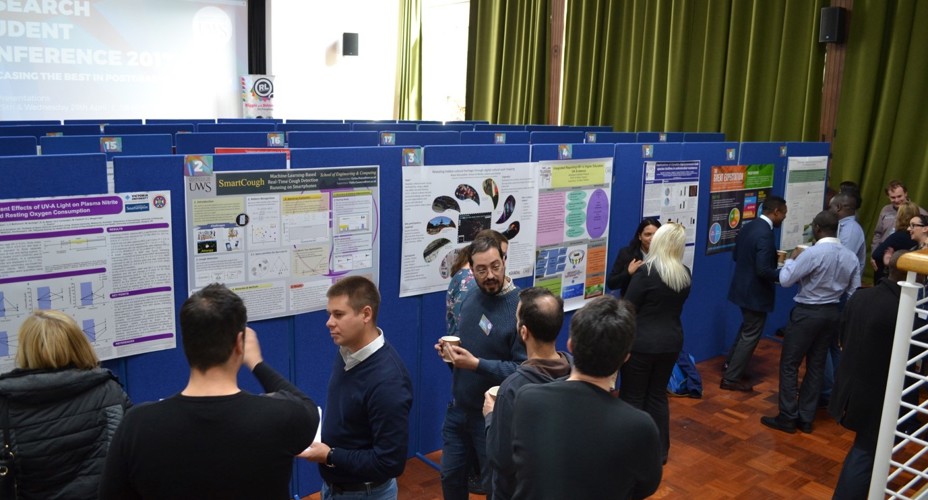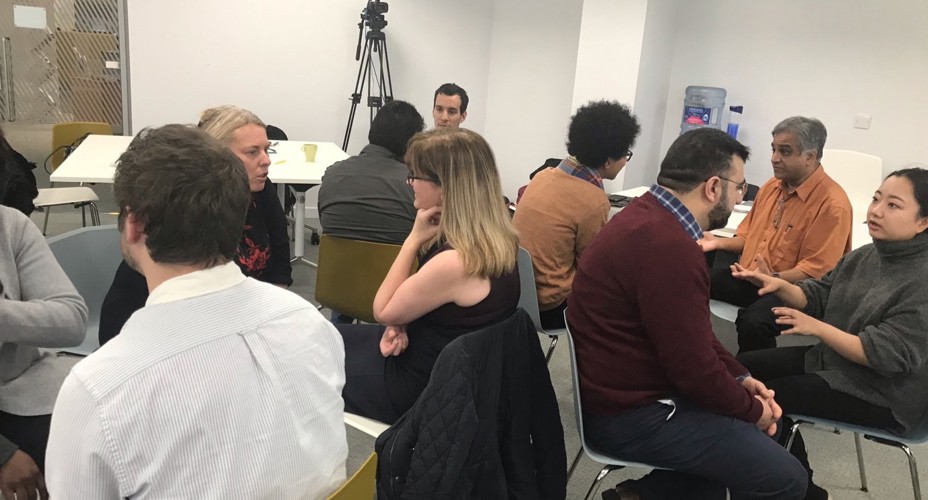UWS has almost 600 postgraduate research students (PhD, DBA, ProfD, MPhil and MRes). Therefore, to better address career progression from PGR studies to academic and non-academic careers, Doctoral College enables:
- Creating and maintaining a collegiate, interdisciplinary research environment with the main aim to generate societally impactful research and produce highly employable doctoral graduates of the future. Our interdisciplinary postgraduate research spans across all Schools, proactively aligning the role of UWS Doctoral College with external drivers (including the need for societal impact as well as PGR student wellbeing and success);
- Fostering a collaborative peer-supported doctoral research culture across the University and our partner institutions worldwide through year-round events and initiatives [examples of initiatives in development: (1) PGR students peer-mentoring to improve transition to PGR studies, (2) Wellbeing and socialising club(s) to tackle isolation and support healthy lifestyle in a friendly environment, (3) joint international events with partner institutions worldwide];
- Monitoring progression and completion as a standard practice but also in response to the above initiatives to ensure (1) these are developed to address identified challenges and (2) that they lead to improved progression and completion patterns.

Key Information
Doctoral College: Key Documents
Key Information - Final Thesis Submission & Viva
Thesis submission and Nomination of Examiners takes place on Skillsforge. Forms used for student viva voce are available below:
UWS PhD viva voce Forms
UWS DProf viva voce Forms
UWS DBA viva voce Forms
UWS MRes Examination Forms
UWS MPhil viva voce Forms
Key Information - Key Contacts (Schools)
- School of Business & Creative Industries - bcidoctoral@uws.ac.uk
- School of Education & Social Sciences - ess@uws.ac.uk
- School of Computing, Engineering & Physical Sciences - ceps-research@uws.ac.uk
- School of Health & Life Sciences - healthandlifesciences@uws.ac.uk
Key Information - Key Contacts (Doctoral College)
- Helen Kennedy - Head of Research (helen.kennedy@uws.ac.uk)
- Dr Mary Ondiek - Doctoral College Manager (mary.ondiek@uws.ac.uk)
- Kirsty Denham, Process and Systems Partner (kirsty.denham@uws.ac.uk)
- Linda Thorburn, Doctoral College Coordinator (linda.thorburn@uws.ac.uk)
- Christina Creamer - Doctoral College Co-ordinator (christina.creamer@uws.ac.uk)
Collegiate Postgraduate Research Environment
Behaviours, Interactions and Wellbeing will represent the three key pillars underpinning the collegiate postgraduate research environment.
Behaviours
In addition to the existing effective processes, Doctoral College continuously develops and maintains systems and practices to instil Ethical practices and professional behaviours. This includes events to demonstrate and embed behavioural traits of highly successful students, supervisors, assessors and examiners. Under the leadership of UWS Academy and the University Ethics Committee, Doctoral College helps in the development of training programmes to address ethical challenges across discipline-specific and interdisciplinary research.
Interactions
During their postgraduate research studies, students need to interact with their peers across different disciplines, academic and industrial communities. Doctoral College engages students at all campuses and partner institutions to jointly organise social events (e.g. international dinners), academic conferences, industry seminars and interdisciplinary gatherings. These wide-ranging interactions build and enhance social skills, confidence and promote UWS internationally as a Global University of choice known for creating a supporting and rewarding Research and Enterprise environment.
Wellbeing
Postgraduate research students mayface numerous challenges during their studies which impact on their wellbeing. Doctoral College, jointly with the University Student Services, SAUWS, Sports Centre and other stakeholders develops and runs a series of events, classes and respite sessions to maintain physical and mental wellbeing of our postgraduate research students.

UWS researcher development programme
The Doctoral College works collaboratively with academic Schools, research groups and other departments such as Research Services and Enterprise Services, supporting strategic collaborations across disciplines and Schools by combining expertise from within our thematic centres of excellence, and numerous partner organisations. Within the Researcher Development Programme PGRs can expect to engage with experienced academic colleagues, fellow PGRs, and a wide range of professional services specialists through seminars and events designed to enhance your research experience at UWS.
Training and development activity is underpinned by the Vitae Researcher Development Framework
and takes a cohort-based approach, allowing participants to undertake activities that support their PhD journey and career development.
Doctoral College will be relaunching the Researcher Development Programme for PGRs in 2024/25. Visit the MS Teams space via the link below to keep up to date with scheduled training activities and seminars for PGR students. Here you will find links to register for all Doctoral College training and events.
As a PGR at UWS you have full access to the Research Skills Toolkit and our partner programmes facilitated by colleagues from University of East Anglia, which are encouraged for those studying part-time.
UWS PGR Teams Page
All research students are expected to engage in the programme during which you will gain a range of valuable skills in addition to the in-depth knowledge and understanding of your research topic. Skills development has a critical part to play in your employability – it is well recognised that employers both within and outwith academia place great importance in, and recognise the value of, developed transferable skills in prospective employees. By planning and undertaking the right training and thinking about your professional and personal development you can significantly improve your employability.
skillsforge
All research student progression is recorded in our progression recording platform, Skillsforge. This platform allows you to view your future milestones, expected end date and submit your 6 month/Annual Report/Transfer Event (if applicable). You will also submit applications for interruption or extension via this platform if required.
All full-time students are asked to submit a monthly supervision report on Skillsforge, with part-time students submitting this a minimum of once every 2 months. Please log into Skillsforge to familiarise yourself with the platform once available. To submit a Supervisory Meeting Report, please select ‘Supervision’, then ‘Create a new Supervisory Meeting Report’. Please ensure you scroll right to the bottom of the form once you have added details of your recent supervision meeting, then tick your name, and press the green ‘sign’ button, then submit the report. This will automatically pass to your Lead Supervisor for comments/actions for next meeting and these will be emailed to you for information.